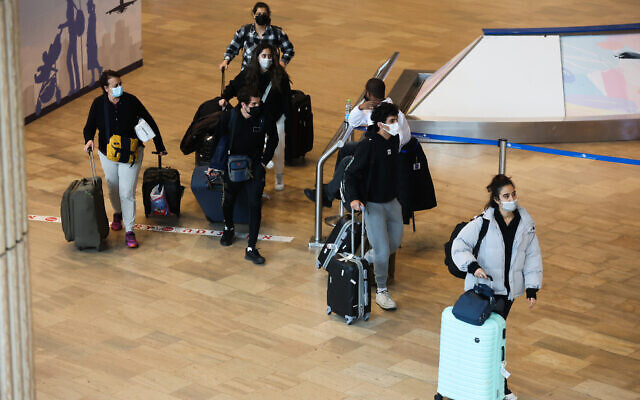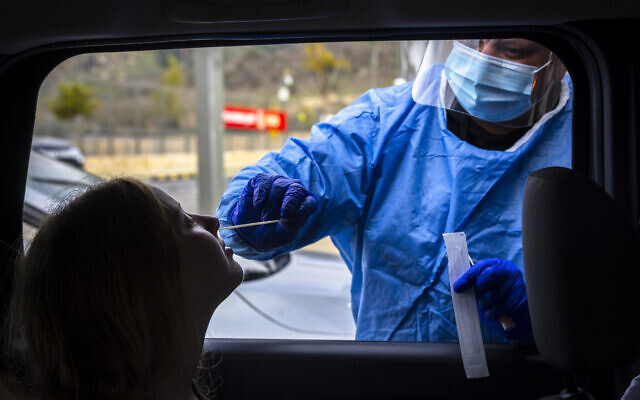Under guidelines adopted amid Omicron surge, the vaccination rate of each class will no longer determine if kids go to school in person or remotely

New coronavirus guidelines for Israeli schools came into force Sunday, with vaccination rates no longer a factor in whether classes can meet in person.
As Israel sees record morbidity levels amid the Omicron-fueled infection wave, health and education officials agreed last week to junk the “traffic light” plan under which the vaccination rate of each class determined if students would attend school in-person or remotely.
The move will effectively ease schools’ ability to hold in-person classes, allowing all schools and daycare centers to return to full activity.
Under the new rules, schools will be subject to the same regulations as commercial settings, where anyone vaccinated must stay home after exposure to a COVID-19 carrier until they take a rapid antigen test and get a negative result. Those testing positive must quarantine for 10 days.
The unvaccinated must self-isolate for at least a week and can only get out of quarantine once they pass an antigen test at a testing facility, not at their own homes.
The new directives also include an end to capacity limits on class sizes and allow school district physicians to decide whether it’s necessary to shut down a school in the event of an outbreak.
Additionally, teachers and school visitors will need to present a “green pass” showing they are protected from the virus to enter school grounds, although unvaccinated teachers can provide negative test results instead.
Mask wearing remains required in schools.

Also Sunday, Israel reopened its borders to vaccinated and some recovered foreign travelers, as record case numbers inside the country make the impact of travel restrictions largely negligible.
On Friday, Israel scrapped a list of “red” countries to which travel is banned over COVID concerns, ostensibly making travel possible to and from all nations.
Coronavirus cases continued to surge over the weekend, with the Health Ministry confirming 18,806 new infections Friday and another 12,495 by Saturday evening.
The number of seriously ill patients increased to 172, up from 143 the day before.
The positive test rate was at 9.5 percent. The virus transmission number, R, indicating how many people each infected person passes the virus on to, dropped slightly from 1.96 to 1.95. The transmission rate is based on data from 10 days earlier and values above 1 show infections are spreading — the higher the number, the greater the rate.
The total number of active cases stood at 108,239. The death toll remained at 8,259, with no change since Friday.
Saturday’s data continued the upward trend in daily cases as the highly contagious Omicron strain of the virus surges through the country.

Eran Segal, a computational biologist from the Weizmann Institute of Science who advises the government on the pandemic, told Channel 12 he expected the country will reach 40,000-50,000 cases per day within a week, though many of these may not be diagnosed.
Still, he forecast that the number of serious cases would remain relatively low, at some 250-350 in the coming week. He noted that Israeli data so far shows Omicron patients are five times less likely to suffer a severe case compared to Delta.
Segal also said most of the current serious cases appear to be caused by Delta and not Omicron, with vaccines offering stronger protection against the former. The vast majority of those in serious condition are unvaccinated.
Omicron, first detected in South Africa, is more contagious but appears to cause fewer cases of severe illness and death than previous variants — especially among vaccinated people.
In Israel as elsewhere, the variant is spreading so fast — straining testing, schools, hospitals and airlines — that some experts are urging a focus instead on hospital admissions. Those, as well as deaths from coronavirus, aren’t climbing as quickly — the result, experts say, of protection offered by vaccinations.
As reported by The Times of Israel
